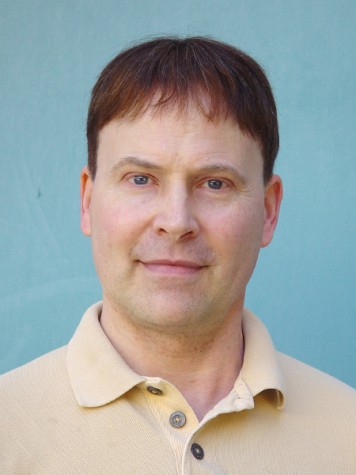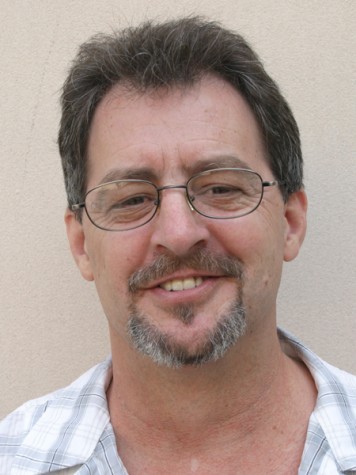Memoirist Bernard Cooper and L.A. Times book critic David L. Ulin inspired a jam-packed Kreider Hall on Oct. 6 at the second annual Los Angeles Writers Reading Series hosted by GCC English faculty members Jocelyn Heaney and Claire Phillips.
Heaney and Phillips founded the series to give students the opportunity to meet the authors of the books they are reading in class. The reading series gives students a glimpse into the career of writing.
The audience gave the writers a warm reception as Ulin prepared to read from his forthcoming work “The Lost Art of Reading” due out in November. In it, “Ulin investigates the challenges and rewards of reading in the age of technological distraction,” said Phillips in her introduction.
“Our culture suffers from a lack of serious, deep thought,” said Ulin. “Conversation is mostly emotionalism versus thoughtful consideration. Reading generates empathy for other people, those unlike ourselves, other ways of thinking, being, and a quietness of stillness.”
“I’m so used to reading with a pen in my hand,” said Ulin, quoting from his book, “that I miss it with a physical ache when I read for pleasure.” He was reading rather quickly as if to mimic the high speed at which he must read to himself. “This is what re-reading ‘The Great Gatsby’ had to offer, a balance of first and second sight,” he said referring to his high school impressions of the book versus those as a father eager to help his son with his homework. “The former was more fun, the latter was more sinful.”
Ulin then compared the art of reading to the uncertainty of being lost at sea hoping to reach the shore. “Reading is like navigating a sea of words not knowing where the words may lead.” he said. To further illustrate this idea, Ulin read from his account of a family scuba-diving experience in Hawaii on a choppy sea.
The swift currents and haystack waves got the better of his wife, Rae and son, Noah, and they spent most of the excursion suffering from sea sickness. Ulin detailed the events with precise and exhaustive language inspiring the attentive GCC audience to listen intently with the hope of learning how to be just as explicit in their own writing.
Ulin’s writing style was captivating, especially when he made an allusion to the movie “Jaws:” “This is where eternity might bear its teeth.”
To help explain the art of good writing, Ulin quoted a passage from the 1933 essay “100 False Starts” by F. Scott Fitzgerald: “We have two or three great moving experiences in our lives [where we are more] caught up, and hounded, and dazzled, and beaten, and broken, and rescued, and illuminated, and rewarded, and humbled [than] ever before.”
In other words, writers should be entitled to invent any number of new stories based on the same few fundamental life-changing experiences.
When Ulin’s applause died down, Heaney introduced Bernard Cooper, a renowned memoirist, essayist and fiction writer (“The Bill from My Father” and “Guess Again”).
First, Cooper talked about his humoristic memoir, “The Bill from My Father.” His father was a divorce attorney when there was no such thing as no-fault divorce. Litigation was his life, and his father was adept at making up stories that were “based on the truth, but not really.” He was also a master of the “firm but detached language of his profession.”
Cooper read, “When I was 28-years-old, my father sent me a bill for his paternal services totaling $2 million. The bill itemized the amounts he had spent on me such as food, clothing, tuition and incidentals.” For example, $72,000 for clothing brought to mind “a warehouse crammed with shirts, pants and jackets past.” Several in the audience snickered. His father’s bill was an “abstract, unpayable enormity.” Cooper’s loves, fears and struggles had been boiled down to nothing more significant than a check for a cup of coffee.
“What an expensive life I had lived,” he said.
“Your obligations to your father are considerable,” his father had written, “and the only way to impress upon you is to compensate your father for the fiscal burdens he bore on your behalf.”
“I was being charged for my upbringing!” Cooper read to uncontrollable outbursts from the audience. “Was this candid camera, April Fool’s day or retribution for some unknown transgression? I didn’t ask to be born. Had I known I would be charged for my boyhood, I would have eaten fewer snacks.”
Cooper’s “even more preposterous counterclaim” might have included “chronic insecurity, $90,000; narcissistic wounds, $75,000; oedipal complex, $15,000; [not to mention] hurts for which there is no restitution,” to which the audience responded with more controlled giggles.
“The punitive spirit of the counterclaim was gratifying . yet depressing,” he said acknowledging that resorting to this would have been exactly what his father had desired.
Cooper confirmed that his father had in fact sent such a letter but died three years before “The Bill from My Father” was published.
To explain this unusual writing technique, Cooper said that writing the memoir was a way for him to figure out what his now deceased father had truly intended by this letter. Unlike prose that is written with the ending already in mind, Cooper explained that “sometimes, writing can be in order to answer a question or to go on an exploration to find something that will serve as the truth.”
“Good writing can come from small things that gain significance by writing about them,” said Cooper as he read from his “strange kind of mongrel” prose-poetry “The Fine Art of Sighing.”
“A kettle hisses, a balloon deflates, your shoulders fall like tube-like pears…. Sometimes I saw my mother’s back expand, then heard her let loose one plummeting note, a sigh so long and weary it might have been her last.”
To write in depth about something as trivial as sighing can be humorous. Cooper ended by referring to the natural function of a sigh, “What begins in sorrow might end in relief.”
All in all, the readings were well received.
“It was a great balance between understanding the work that the students studied, and the art of writing,” said Heaney. “The students were excited because they got to ask about the writers’ story as well as how to improve as writers themselves. The authors’ insights on the writing process came from years of experience.”
English faculty member and published poet Bart Edelman said, “Both writers brought a wonderful and intriguing sense of their own experiences to the audience regarding what it means to fuse your own personal memoir, if you will, to the fine and intensive craft of writing, especially as it pertains to creative non-fiction.”
To express their appreciation for these two Los Angeles writers, English 104 students formed a line to have their textbooks signed by Cooper and Ulin. The students were all smiles and the collective inspiration was more tangible than a rainbow after a rainstorm.
For more information the English department can be reached at (818) 240-1000, ext. 5606.


